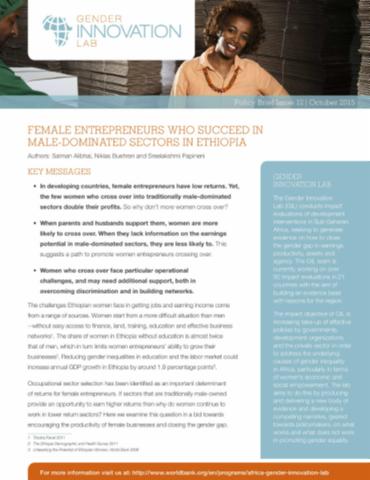The World Bank is a vital source of financial and technical assistance to developing countries around the world. We are not a bank in the ordinary sense but a unique partnership to reduce poverty and support development. The World Bank Group has two ambitious goals: End extreme poverty within a generation and boost shared prosperity.
- To end extreme poverty, the Bank's goal is to decrease the percentage of people living on less than $1.25 a day to no more than 3% by 2030.
- To promote shared prosperity, the goal is to promote income growth of the bottom 40% of the population in each country.
The World Bank Group comprises five institutions managed by their member countries.
The World Bank Group and Land: Working to protect the rights of existing land users and to help secure benefits for smallholder farmers
The World Bank (IBRD and IDA) interacts primarily with governments to increase agricultural productivity, strengthen land tenure policies and improve land governance. More than 90% of the World Bank’s agriculture portfolio focuses on the productivity and access to markets by small holder farmers. Ten percent of our projects focus on the governance of land tenure.
Similarly, investments by the International Finance Corporation (IFC), the World Bank Group’s private sector arm, including those in larger scale enterprises, overwhelmingly support smallholder farmers through improved access to finance, inputs and markets, and as direct suppliers. IFC invests in environmentally and socially sustainable private enterprises in all parts of the value chain (inputs such as irrigation and fertilizers, primary production, processing, transport and storage, traders, and risk management facilities including weather/crop insurance, warehouse financing, etc
For more information, visit the World Bank Group and land and food security (https://www.worldbank.org/en/topic/agriculture/brief/land-and-food-security1
Resources
Displaying 721 - 725 of 4907GRI Index FY09
The response to the GRI Indicators
presents a glimpse into the World Banks (also known as the
International Bank for Reconstruction and Development or
IBRD in the capital market) complex suite of activities.
Topics that are of interest to sustainable investment
communities, NGOs, and country clients determine materiality
for the purposes of this report. Reporting priorities are
determined annually based on the corporate priorities of the
GRI Index FY11
The response to the global reporting
initiative (GRI) indicators provides a brief introduction to
the World Bank’s (WB’s) complex suite of activities. The WB
consists of the International Bank of Reconstruction and
Development (IBRD) and the International Development
Association (IDA). Materiality is determined through an
assessment carried out based on GRI guidance. The assessment
evaluates the risks to the organization, the importance to
GRI Index FY12
The response to the global reporting
initiative (GRI) indicators provides a brief introduction to
the World Bank’s (WB’s) complex suite of activities. The WB
consists of the International Bank of Reconstruction and
Development (IBRD) and the International Development
Association (IDA). Materiality is determined through an
assessment carried out based on GRI guidance. The assessment
evaluates the risks to the organization, the importance to
Azerbaijan: Systematic Country Diagnostic
Azerbaijan’s performance on the twin
goals has been commendable. The middle class has doubled in
size and extreme poverty has almost been eliminated in the
space of a decade. At the same time, regional differences
persist, with significantly higher poverty rates in lagging
regions, and Baku dominating overwhelmingly in terms of
share of GDP. Disparities in welfare also persist between
rural and urban areas as well as across social groups. As
Female Entrepreneurs Who Succeed in Male-Dominated Sectors in Ethiopia
In developing countries, female entrepreneurs have low returns. Yet, the few women who cross over into traditionally male-dominated sectors double their profits. So why don't more women cross over? When parents and husbands support them, women are more likely to cross over. When they lack information on the earnings potential in male-dominated sectors, they are less likely to. This suggests a path to promote women entrepreneurs crossing over. The challenges Ethiopian women face in getting jobs and earning income come from a range of sources.







